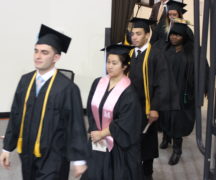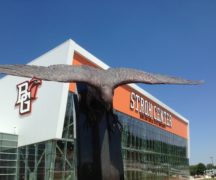By DAVID DUPONT
BG Independent News
Soccer star Robbie Rogers should have been happy. At 24 he had achieved so much of what he’d been dreaming about and working for since he was 7. He’d won a national collegiate championship in his freshman year at the University of Maryland. Played on the US National team. Played in the Olympics. Won a professional championship with the Columbus Crew. And now was supporting himself as a soccer player on an English team.
Yet time and again he found himself after a victory alone in his room, feeing hollow. “Why am I not happy?” he found himself wondering. “Why am I not out celebrating with my friends?”
While he was showing the world what kind of soccer player he was, Rogers was not showing even those closest to him who he really was beneath the surface, a gay man.
“Football was my escape, my purpose, my identity” he told an audience at Bowling Green State University. “It hid my secret and gave me more joy than I could imagine.”

Ivi Casagrande and Yannick Kluch of We Are One Team introducing Robbie Rogers.
Rogers visited BGSU at the invitation of We Are One Team, a student organization that promotes diversity and inclusion through sports, as part of its Our Voices series.
A breaking point came in 2012. As he peddling on a stationary bike in England, he overheard two teammates’ casual, homophobic banter. It was the kind of talk he’d heard often, and he realized something had to change.
He thought to himself: “There’s no possible way I can come out in this world. … I made the decision at that point I would retire and come out. … It was time to discover myself away from football.”
He told his parents, conservative Catholics, that he was gay. Then he came out publically. He was accepted into the London College of Fashion.
“Honesty is a bitch,” he said. “But honesty makes so simple and clear.”
On a visit back to California to visit his parents, his agent asked if he’d travel to a Nike event in Portland, Oregon, to speak to high schools students involved in their schools’ GSAs.
Rogers didn’t know that a GSA was a Gay Straight Alliance. When he was in high school, such a thing would have been unthinkable. He spoke to the high school students, and afterward the admiring teens lined up to get their photos taken with him.
He thought they were amazing to be so open and engaged as high school students.
They made him realize he needed to at least go back and train. “I need to at least test my courage,” he said.
He reached out Coach Bruce Arena, then with the L.A. Galaxy, to see if he could train with the team. His connections with the club went back to his youth.
After a few weeks, Arena offered him a spot on the team. He remembered being unable to sleep the night before he was scheduled to show up for training.
The team captain Landon Donovan called him up, and said that the coach had told the team he was joining and they were not concerned about the prospect of having a gay teammate.
“I was making it a scarier situation than everyone else was,” Rogers said.
His teammates accepted him. Now Rogers found himself the center of attention. In demand by the press and for appearances. Not because of soccer, but because of his status as the first male professional athlete to come out as gay.
In addition to all the usual pressures of being a professional athlete, he found himself having to acclimate himself to the gay social scene. Going on first dates. Going to a gay club for the first time.
That first year was hard, he said. He again considered quitting.
But the team agreed to protect him. To limit the amount he was available to the media. And for his part, he learned to say “no” appearances.
He wrote a memoir, “Coming Out To Play,” about his experience, and that was at times painful and revelatory. He realized: “I never gave my family the chance to really love me. … I was so afraid they would reject me.”
He went on to win another championship with the Galaxy. HE found he finally could finally celebrate and emotionally enjoy the moment. And when the team visited the White House President Barack Obama honored him in particular. Even his staunchly Republican parents were impressed.
Now in his fifth season with the Galaxy, being gay has become unremarkable.
He and his partner now have a son together.
Rogers praised the efforts of WA1T He reflected that when he was in college “I was so afraid of my own shadow, afraid to ask questions. … It’s been such an amazing experience for me to be around all of you.”
At the request of ESPN he wrote a letter to his 12-year-old self.
“You don’t have to feel you are alone,” he wrote. And though he’s reluctant to give advice he did tell his younger self “to find someone you can speak to about what you’re feeling inside. Someone who you can trust, someone who won’t judge you or expose you because you can’t walk around with a burden like this you’re carrying. You need to share it.”
And while he wouldn’t tell him what was in store, Rogers wrote “that day may come when you’re able to face the world as the beautiful person you are.”





